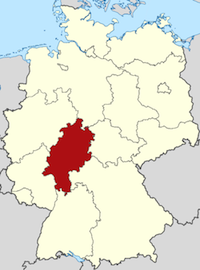While all of Germany goes to the polls on September 22 to elect a new national government, voters in the state of Hesse will also be choosing their own state government.![]()
![]()
Although Hesse isn’t as large as Bavaria, which held its own state-level elections on September 15, exactly one week before the federal vote, the election in Hesse is as much a tossup as the national election is likely to be a certain win for German chancellor Angela Merkel.
Hesse, a state in south-central Germany that borders both Bavaria and North Rhine-Westphalia, is home to Frankfurt, the financial center of Germany and in many ways the financial center of Europe. With just over 6 million residents, Hesse is only the fifth-most populous state in Germany, but its role in the German economy means that the result on Sunday is important — its GDP per capita, on a regional basis, is Germany’s highest (except for the small city-states of Hamburg and Bremen). 
It’s also important because the result of the Hessian election will determine five votes in the Bundesrat, the upper house of Germany’s parliament — a loss here on Sunday would leave the center-right with firm control of just 10 out of 69 votes in the upper house. That would strengthen the parliamentary check that the center-left holds through its domination of the state governments that cumulatively determine the representatives to the Bundesrat.
It’s also a state where the two main center-right and center-left forces are balanced nearly equally in polls — the race is expected to be incredibly close.
Merkel’s Christlich Demokratische Union Deutschlands (CDU, Christian Democratic Party) has controlled Hesse’s government since the 1999 elections, when Roland Koch led the CDU into government alongside the liberal Freie Demokratische Partei (FDP, Free Democratic Party).
But things took a poor turn after a particularly brutal election in January 2008, after Koch and the CDU took a hard-right, anti-immigrant turn. The CDU and the center-left Sozialdemokratische Partei Deutschlands (SPD, Social Democratic Party) essentially tied in that election — each won 42 seats in the 118-seat Landtag (state parliament). With neither the CDU’s preferred coalition partner, the Free Democrats nor the SDP’s preferred partner, Die Grünen (the Greens), winning enough seats to form a stable majority, it left the democratic socialist Die Linke (the Left) holding the balance of power after it won 5.1% of the vote, enough to win (just barely) six seats, entering Hesse’s Landtag for the first time.
SPD leader Andrea Yspilanti ultimately decided to work with the Left — controversial for the party’s links to former communists in East Germany — but a revolt within the Social Democrats caused her attempts to fail and led to early elections in January 2009. The Hessian electorate blamed the Social Democrats for the political crisis, and the SPD dropped 13% from its result just a year earlier, giving the CDU/FDP coalition a reprieve.
Koch stepped down as minister president in August 2010 to pursue business interests, handing over the reins to trusted acolyte Volker Bouffier (pictured above, left, campaigning with Merkel). Bouffier previously served as Koch’s decade-long minister of the interior (and sport), embracing more robust surveillance and police techniques throughout the 2000s, which earned him the nickname, ‘Black Sheriff.’ Continue reading Close state election in Hesse could tilt federal Bundesrat further left
